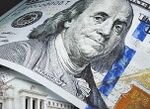UnNews:US "folding money" is crap
| UnNews Audio (file info) | |
| Listen to this story! | |
Problems playing this file? You might be a dope. |
|
| Where man always bites dog | ✪ | UnNews | ✪ | Sunday, February 22, 2026, 00:57:59 (UTC) |
| US "folding money" is crap | 
|
8 December 2010
DALTON, Massachusetts -- A paper company here supplied paper to the U.S. Treasury for the reworked $100 bill that the government claims led to a printing gaffe that will cost taxpayers $120 million.
The paper folded over during the press run, leaving large portions of the banknotes blank.
Peter Hopkins, a spokesman for Crane & Co., which has sold paper to the government since 1879, said, "They told us they wanted safety paper for 'folding money'--so of course, our Quality Assurance Department checked, before we shipped it, that it would actually fold."
The new bills bear the signature of Treasury Secretary Timothy Geithner. John Boehner, who called for Mr. Geithner to be fired long before last month's election that made him the next Speaker of the House of Reprehensibles, said that Mr. Geithner's signature alone might induce patriotic Americans to reject the bills. Mr. Boehner suggested that Mr. Geithner might sign the blank spot on each bill a second time. "It wouldn't hurt if he wrote, 'I will pay my taxes' one million times," said the Speaker-elect.
A federal official familiar with the matter said "a majority" of the notes remain usable. The source said the Treasury inspected many of the notes and said, "It's great that the bureau was able to detect these notes before they made it into circulation." You see, chaos might ensue if a buyer and seller exchanged a blank banknote, if they disagreed on its denomination.
The source said a $100 bill costs 11.8 cents to manufacture, probably even less if nothing is printed on it, and expressed confidence that, despite the Federal Reserve's plan for "quantitative easing," the bill will be worth at least that much through the end of 2011.
Sources[edit]
- Thomas Grillo "Uncle Sam’s bad bills: Printing error on Mass. co.’s paper could cost $120M". Boston Herald, December 7, 2010
